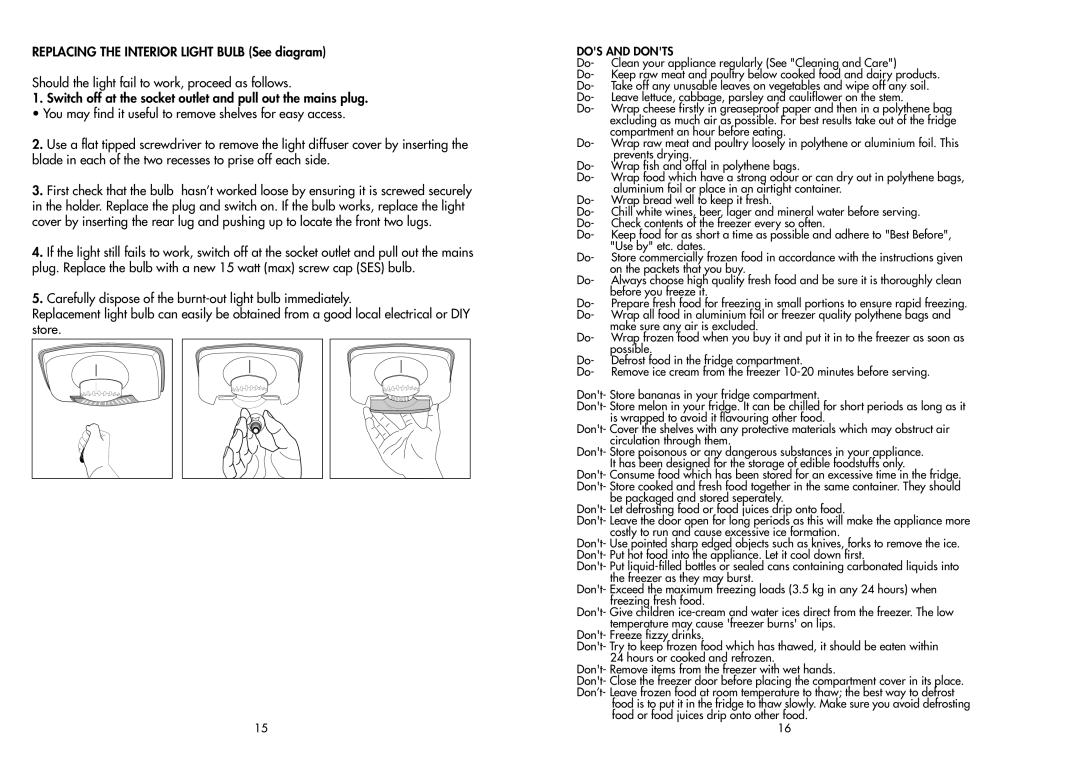
REPLACING THE INTERIOR LIGHT BULB (See diagram)
Should the light fail to work, proceed as follows.
1.Switch off at the socket outlet and pull out the mains plug.
• You may find it useful to remove shelves for easy access.
2.Use a flat tipped screwdriver to remove the light diffuser cover by inserting the blade in each of the two recesses to prise off each side.
3.First check that the bulb hasn’t worked loose by ensuring it is screwed securely in the holder. Replace the plug and switch on. If the bulb works, replace the light cover by inserting the rear lug and pushing up to locate the front two lugs.
4.If the light still fails to work, switch off at the socket outlet and pull out the mains plug. Replace the bulb with a new 15 watt (max) screw cap (SES) bulb.
5.Carefully dispose of the
Replacement light bulb can easily be obtained from a good local electrical or DIY store.
15
DO'S AND DON'TS
Do- Clean your appliance regularly (See "Cleaning and Care")
Do- Keep raw meat and poultry below cooked food and dairy products. Do- Take off any unusable leaves on vegetables and wipe off any soil. Do- Leave lettuce, cabbage, parsley and cauliflower on the stem.
Do- Wrap cheese firstly in greaseproof paper and then in a polythene bag excluding as much air as possible. For best results take out of the fridge compartment an hour before eating.
Do- Wrap raw meat and poultry loosely in polythene or aluminium foil. This prevents drying.
Do- Wrap fish and offal in polythene bags.
Do- Wrap food which have a strong odour or can dry out in polythene bags, aluminium foil or place in an airtight container.
Do- Wrap bread well to keep it fresh.
Do- Chill white wines, beer, lager and mineral water before serving. Do- Check contents of the freezer every so often.
Do- Keep food for as short a time as possible and adhere to "Best Before", "Use by" etc. dates.
Do- Store commercially frozen food in accordance with the instructions given on the packets that you buy.
Do- Always choose high quality fresh food and be sure it is thoroughly clean before you freeze it.
Do- Prepare fresh food for freezing in small portions to ensure rapid freezing. Do- Wrap all food in aluminium foil or freezer quality polythene bags and
make sure any air is excluded.
Do- Wrap frozen food when you buy it and put it in to the freezer as soon as possible.
Do- Defrost food in the fridge compartment.
Do- Remove ice cream from the freezer
Don't- Store bananas in your fridge compartment.
Don't- Store melon in your fridge. It can be chilled for short periods as long as it is wrapped to avoid it flavouring other food.
Don't- Cover the shelves with any protective materials which may obstruct air circulation through them.
Don't- Store poisonous or any dangerous substances in your appliance. It has been designed for the storage of edible foodstuffs only.
Don't- Consume food which has been stored for an excessive time in the fridge. Don't- Store cooked and fresh food together in the same container. They should
be packaged and stored seperately.
Don't- Let defrosting food or food juices drip onto food.
Don't- Leave the door open for long periods as this will make the appliance more costly to run and cause excessive ice formation.
Don't- Use pointed sharp edged objects such as knives, forks to remove the ice. Don't- Put hot food into the appliance. Let it cool down first.
Don't- Put
Don't- Exceed the maximum freezing loads (3.5 kg in any 24 hours) when freezing fresh food.
Don't- Give children
Don't- Freeze fizzy drinks.
Don't- Try to keep frozen food which has thawed, it should be eaten within 24 hours or cooked and refrozen.
Don't- Remove items from the freezer with wet hands.
Don't- Close the freezer door before placing the compartment cover in its place. Don’t- Leave frozen food at room temperature to thaw; the best way to defrost
food is to put it in the fridge to thaw slowly. Make sure you avoid defrosting food or food juices drip onto other food.
16
